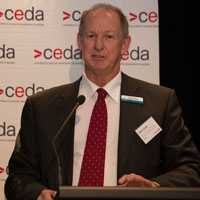PROGRESS 2050: Toward a prosperous future for all Australians
31/07/2012
For WA to realise the economic potential of its investment pipeline, the skills gap must be addressed through both training and migration, an expert panel has told a CEDA forum in Perth.
 |
|
|
|
Roy Hill, Chief Executive Officer, Barry Fitzgerald said the Roy Hill iron ore project needs 8500 construction positions and all forecasts predict skilled labour shortages, including independent studies that predict a shortfall of up to 1715 skilled people.
Enterprise Migration Agreements (EMAs) are necessary to demonstrate that if we can't source local labour we can still construct projects, he said.
"EMA is about risk mitigation. It is about giving us certainty… the assurance so we can go to the banks and say we can deliver the project on time and on budget," he said.
Despite what some may think, the wages and employment conditions must be the same for local and migrant workers and it actually costs much more to recruit overseas, he said.
"It's only when we can't find skilled, available and competent Australians that we will employ through the EMA," he said.
 |
|
Skilled migration is necessary in WA to fill jobs unable to be met by the local market, Department of Training and Workforce Development, Executive Director Policy, Planning and Innovation, Simon Walker said.
In this rapidly growing economy, we need to ensure we have the skilled people to meet the needs of the state now and in the future, he said.
Based on forecasts, and despite a ramp up of apprentices and trainees, WA will have a potential deficit of 75,800 workers by 2015, he said.
"No matter what we do in the training system, particularly trade training, 10,000 apprentices wouldn't be ready in time to service the demand," he said.
"This is why we need a temporary migration scheme, like 457 visas, to fill that gap."
 |
|
Chamber of Commerce and Industry Western Australia, Manager - Migration Services, Glen Dival said: "WA has a significant pipeline of investment activity and the major risk to these projects is a shortage of labour, both skilled and semi-skilled.
"There is certainty still a large pool of under-employed workforce resources in WA…but that's not enough to meet the worker needs of WA now or in the future.
"The first choice must always be to employ and train Australians, but our demand for skilled labour is so high and so varied that we must also have strong targeted migration programs, to provide this state with the workers that we need.
"The existing immigration programs still do not provide employers with the level of quick access necessary to meet their immediate needs.
"EMAs and RMAs (Regional Migration Agreements)…offer tremendous potential, but they are bulky, inflexible and are taking far too long to resolve.
"A regional version of the 457 visa program needs to be re-introduced to WA so a broader range of occupations can be sponsored by employers in regional WA.
